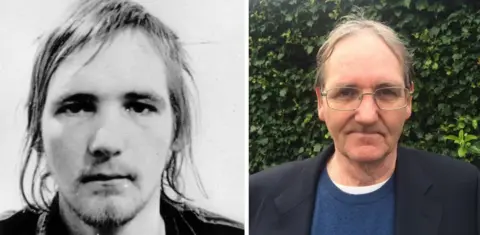Guildford Four's Paddy Armstrong in plea to pub bomb coroner
 BBC
BBCOne of the Guildford Four, Paddy Armstrong, has said a coroner could end the "secrecy" over pub bombings that killed five people in 1974.
A pre-inquest review is being held to look at resuming a full inquest, after original proceedings never concluded.
A further 65 people were injured when the IRA blew up two pubs in Guildford.
Mr Armstrong said he would be there on behalf of the wrongly-convicted Four. He said they were kept in jail for 15 years and still wanted to know why.
Soldiers Ann Hamilton, 19, Caroline Slater, 18, William Forsyth, 18, and John Hunter, 17, died following the first blast at the Horse and Groom on 5 October, with plasterer Paul Craig, 21.
A four-man IRA unit known as the "Balcombe Street gang" claimed responsibility in 1976 but were not charged.
Over the years it has been disputed how many members were in the unit - a court transcript suggested up to 20.
The case of the Guildford Four became known as one of Britain's biggest miscarriages of justice.

"I want to know why I was in prison for 15 years when those who did it were never charged with it," Mr Armstrong, 68, said.
"We had been in prison a year when the Balcombe Street gang admitted it and said innocent people were in jail... What are they hiding?"
He said he believed an inquiry by Surrey coroner Richard Travers "might get some answers".

The Guildford Four

- 5 October 1974 - IRA bombs explode in two pubs in Guildford, Surrey, killing five people and injuring scores more. Guildford was known as a "garrison town", with several barracks nearby, at Stoughton and Pirbright and Aldershot in Hampshire, and a night-life that was popular with the 6,000 military personnel in the area
- 22 October 1975 - Paul Hill, Gerry Conlon, Patrick Armstrong and Carole Richardson - the Guildford Four - jailed for life at the Old Bailey
- 19 October 1989 - After years of campaigning, the Court of Appeal quashes the convictions, ruling them as unsafe, and releases them
- 9 February 2005 - Prime Minister Tony Blair formally apologises to the Guildford Four for the miscarriage of justice they suffered

Mr Armstrong's comments coincided with a decision that a file thought to contain evidence from former police chief Lord Peter Imbert should remain closed at The National Archives.
The file contains evidence given on 7 June 1993 - the day Lord Imbert, then Sir Peter, gave an account of how the Balcombe Street admissions were dealt with to former judge Sir John May during a five-year inquiry.
Several hundred files from Sir John's inquiry remain closed at Kew - Mr Armstrong has repeatedly made calls for their release.
 Getty Images
Getty ImagesGovernment reasons for keeping the latest file closed include a public interest in "ensuring police are able to carry out any further investigations", and that it also contains information relevant to investigations into "current Irish Republican Terrorism activities".
Mr Armstrong branded the reasons "ridiculous" and criticised the "secrecy" of Sir John's inquiry, part of which was held in private.
"Why are they not showing any of it?" he asked. "There must be something in it."

The Imbert Files

On 7 June 1993, former Surrey and Met police chief Sir Peter Imbert gave evidence to the John May inquiry in a private hearing.
A public transcript has been viewable since 1994, but three other files containing evidence from that day are to stay closed.
The public transcript showed the inquiry asked about Imbert's interviews with the Guildford Four and scientific research that linked the Guildford and Woolwich bombs with other explosions after the Guildford Four had been arrested.
The bulk of the hearing looked at what police did after the Balcombe Street gang admitted bombing Guildford and a pub in Woolwich.
Imbert said the gang should have been charged over both Guildford and Woolwich but this did not happen. He also said police doubted the "veracity" of their accounts.

In a statement, Surrey Police said the force began work in 2017 to identify, preserve and schedule material it held on the pub bombings.
"The case is not being re-investigated or made subject to a formal review at this time, however, once all the material held has been scheduled, an assessment will be carried out to consider whether there are any viable investigative opportunities," it said.
"If any potential opportunities are identified, a comprehensive review would then be necessary."
It said the force "neither requests nor opposes the resumption of inquests".
KRW Law, representing the family of victim Ann Hamilton and survivor Yvonne Tagg, applied to resume the inquest after the BBC obtained papers about the case.
Mr Armstrong, who flew from Dublin to Surrey for the pre-inquest review, said it was "an honour" to be there for the Guildford Four, two of whom - Carole Richardson and Gerry Conlon - have died. Paul Hill now lives in the US.